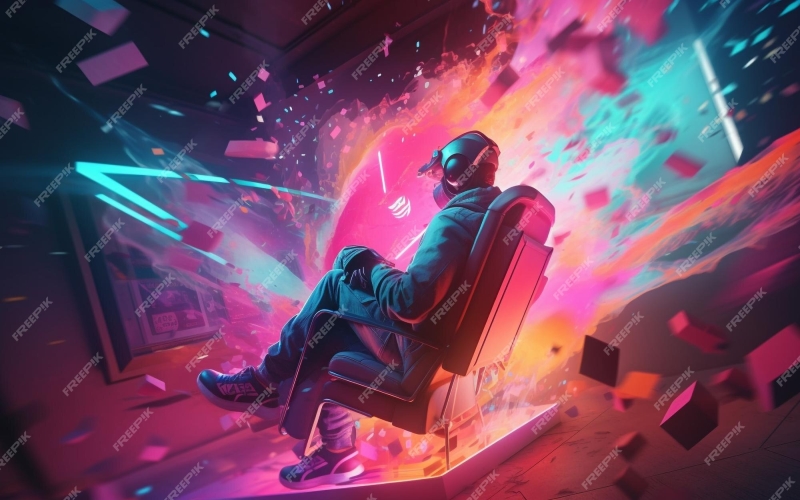In 2023, Netflix CEO Reed Hastings said in a letter to shareholders that the service’s main competitor is not Disney+ or HBO, but the computer game Fortnite. Games, the latest format in the global entertainment industry, are becoming increasingly popular and interactive. Developers are adopting new technologies and even provoking their development.
Experts expect that the market for the gaming industry’s top trend—cloud gaming—will grow to $450 million by 2025. Technology is already making gaming more democratic. Services like Google Stadia, Playstation Now or Playkey run resource-intensive applications without being tied to hardware capabilities. In the future, they will give developers the freedom to create without technical restrictions and play different types of entertainments as well as big bamboo slot free.
There will no longer be a barrier in the form of expensive equipment: anyone will be able to realize their fantasies in creating games;
A new class of games will emerge that are initially created for cloud standards and are not technically limited. Unprecedented horizons will open up for virtual worlds, including in VR format. Cities and even entire planets can be worked out to the smallest detail – it will be difficult to distinguish them from real ones;
The boundaries between genres will disappear: a new class of games will combine many genre fragments;
The element of social approval of the actions of the player character will become important – virtual communities will increasingly resemble real ones. For example, the developers of Death Stranding introduced likes as a tool to encourage actions of other players – such as buildings or danger signs.
The driver of cloud gaming development is the spread of 5G. This communication standard will increase speed and make the transfer of massive amounts of data from the cloud uninterrupted. The technology will cause a wave of growth in gamers who will play from their phones. There are already more than 2 billion such users, and thanks to 5G their number will increase several times.
Games instead of Zoom conferences and school lessons
Games are no longer just entertainment. Virtual worlds are becoming a new platform for communications. They hold work meetings, build university campuses and teach, and organize concerts.
The world is moving faster and faster towards the transfer of communications into gaming reality. Self-isolation only helped this process – the universes of games like Fortnite are much more diverse and functional than Zoom. They have a wide range of personalization tools and allow you to gather a huge audience. For example, the Travis Scott concert mentioned above was watched by more than 27 million viewers.
In the future, games will also transform the education system. Of course, they will not replace lessons entirely, but rather will become an addition to them: the skills acquired in the games will be used both in school and at work. Thus, researchers from the University of Glasgow found that games develop critical and reflective thinking, and also develop reaction.
Teachers have already adopted games: a geometry teacher from San Diego teaches lessons in the VR offshoot of Half-Life. Last summer, the Internet Development Institute proposed including Dota 2 or World of Tanks electives in the school curriculum. Russian experts believe that these games develop creativity, logic and teamwork.
New content consumption model
The difference between games and other forms of entertainment, such as cinema, will be completely erased. The new Unreal Engine 5 is already producing a picture that is hard to distinguish from Hollywood. Virtual avatars of actors become heroes of Cyberpunk 2077 or Death Stranding: games are an interactive way of storytelling that will change the very dramaturgy and the relationship between the viewer and the screenwriter.
The interactivity of virtual universes will allow us to finally break the fourth wall. The viewer will determine the development of the plot and become the director of their own productions within the game world thanks to streams. The very definition of sports will also change: millennials are already more likely to watch broadcast games than traditional sports matches. Thanks to the maturation of the audience, eSports will become a familiar type of competition – maybe even included in the Olympic disciplines.
The lack of platform locking of games thanks to cloud technology will also impact our consumption. Users will pay for game content and for the social part of games such as access to the community, and not for the platform. You can enter the virtual world from any device with a screen and a 5G connection – from a smart refrigerator to a smart watch.
The future of gaming devices
Character control will change: the development of brain-computer interfaces will make it possible to control his actions using brain signals. Such devices already exist: through the Emotiv EPOC device, you can work with software “with the power of thought” – for example, control drones using neurotransmitters. According to Ericsson experts, the technology will become widespread within this decade.
The mentioned 5G standard will allow the use of not only vision and hearing, but all senses in games. We will find the “Internet of Senses”: digital sensors using artificial intelligence, VR and AR will allow you to taste the gaming universe – literally.





